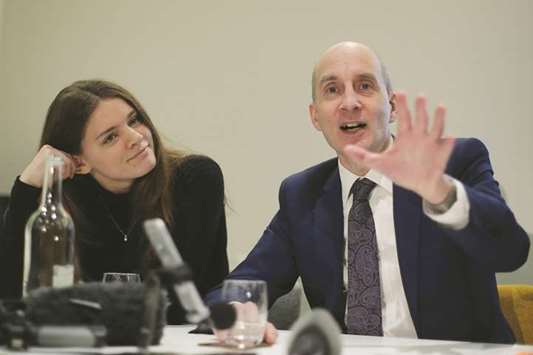A post-Brexit transition is “not a given”, Michel Barnier warned Britain yesterday, saying London had “substantial” objections to the European Union’s offer and that parts of it were not up for negotiation.
The EU negotiator’s stark message, which weakened the sterling, came after EU diplomats and officials warned in recent days that sticking points in the talks were threatening the whole Brexit schedule.
Speaking to journalists in Brussels after the latest round of Brexit talks, Barnier listed Britain’s issues with the status-quo transition the EU has offered until the end of 2020.
It envisages London will remain bound by all EU laws and pay into the bloc’s budget but have no say in decisions. London has said it wants to reach a deal on transition in March.
“If these differences persist, a transition is not a given,” Barnier said. “If these disagreements were to persist, there will undoubtedly be a problem.”
He said Britain rejects giving lifetime rights to EU citizens who arrive after Brexit but before 2021, demands mechanisms to avoid any new EU laws it dislikes, and opposes a clause to unilaterally suspend Britain’s access to the single market in case of disputes.
“Frankly, I am surprised by these disagreements,” he said. “In demanding the benefits of the single market, the customs union... the United Kingdom should logically accept all the rules and obligations until the end of the transition.”
Barnier stressed the EU was waiting for London to explain what sort of future relationship it wanted with the EU and how to avoid border controls between the north and south of Ireland if it leaves the bloc’s customs union in the future, as Prime Minister Theresa May has said it will.
“The sooner the UK makes its choices, the better,” Barnier said. “A UK decision to leave the single market and leave the customs union would make border checks unavoidable.
“We focus on solutions to avoid a hard border...any solution must be precise, clear and unambiguous.”
Barnier said Britain had to sort out all issues related to its divorce from the bloc — including ties with the EU nuclear agency Euratom and personal data protection — to win a transition period after it leaves the EU, as is due next March.
“There is no transition possible without a withdrawal agreement,” he said. London particularly dislikes the EU retaining the right to cut Britain off from its market. Britain’s Brexit negotiator David Davis yesterday called its approach “discourteous”. “You will not find in our attitude... the least trace of discourtesy or willingness to punish,” Barnier responded.
He said the next round of Brexit negotiations, expected in two weeks’ time, would look again at the transition, as well as whether Britain would be covered by EU deals with third countries during that time.

Lord Andrew Adonis, former transport secretary and leader of the campaign u201cBrexit is not a Done Dealu201d, gestures as he speaks at The Clubhouse in central London yesterday during a press briefing to launch the campaign. The main campaign groups who would like to see the UK remain in the European Union came together to launch a common campaign to allow the people of Britain to have the final say on Brexit.
